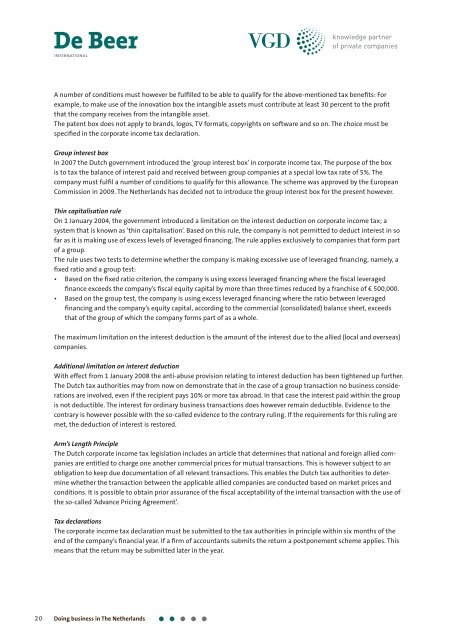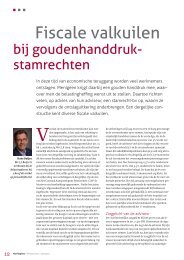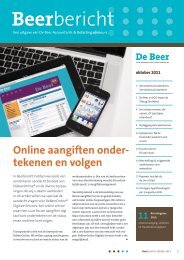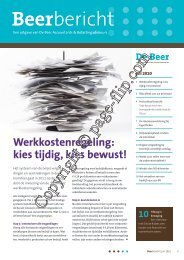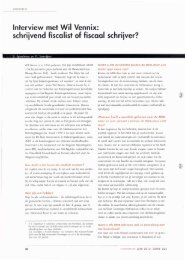De Beer
De Beer
De Beer
- No tags were found...
Create successful ePaper yourself
Turn your PDF publications into a flip-book with our unique Google optimized e-Paper software.
<strong>De</strong> <strong>Beer</strong>INTERNATIONALknowledge partnerof private companiesA number of conditions must however be fulfilled to be able to qualify for the above-mentioned tax benefits: Forexample, to make use of the innovation box the intangible assets must contribute at least 30 percent to the profitthat the company receives from the intangible asset.The patent box does not apply to brands, logos, TV formats, copyrights on software and so on. The choice must bespecified in the corporate income tax declaration.Group interest boxIn 2007 the Dutch government introduced the ‘group interest box’ in corporate income tax. The purpose of the boxis to tax the balance of interest paid and received between group companies at a special low tax rate of 5%. Thecompany must fulfil a number of conditions to qualify for this allowance. The scheme was approved by the EuropeanCommission in 2009. The Netherlands has decided not to introduce the group interest box for the present however.Thin capitalisation ruleOn 1 January 2004, the government introduced a limitation on the interest deduction on corporate income tax; asystem that is known as ‘thin capitalisation’. Based on this rule, the company is not permitted to deduct interest in sofar as it is making use of excess levels of leveraged financing. The rule applies exclusively to companies that form partof a group.The rule uses two tests to determine whether the company is making excessive use of leveraged financing, namely, afixed ratio and a group test:• Based on the fixed ratio criterion, the company is using excess leveraged financing where the fiscal leveragedfinance exceeds the company’s fiscal equity capital by more than three times reduced by a franchise of € 500,000.• Based on the group test, the company is using excess leveraged financing where the ratio between leveragedfinancing and the company’s equity capital, according to the commercial (consolidated) balance sheet, exceedsthat of the group of which the company forms part of as a whole.The maximum limitation on the interest deduction is the amount of the interest due to the allied (local and overseas)companies.Additional limitation on interest deductionWith effect from 1 January 2008 the anti-abuse provision relating to interest deduction has been tightened up further.The Dutch tax authorities may from now on demonstrate that in the case of a group transaction no business considerationsare involved, even if the recipient pays 10% or more tax abroad. In that case the interest paid within the groupis not deductible. The interest for ordinary business transactions does however remain deductible. Evidence to thecontrary is however possible with the so-called evidence to the contrary ruling. If the requirements for this ruling aremet, the deduction of interest is restored.Arm’s Length PrincipleThe Dutch corporate income tax legislation includes an article that determines that national and foreign allied companiesare entitled to charge one another commercial prices for mutual transactions. This is however subject to anobligation to keep due documentation of all relevant transactions. This enables the Dutch tax authorities to determinewhether the transaction between the applicable allied companies are conducted based on market prices andconditions. It is possible to obtain prior assurance of the fiscal acceptability of the internal transaction with the use ofthe so-called ‘Advance Pricing Agreement’.Tax declarationsThe corporate income tax declaration must be submitted to the tax authorities in principle within six months of theend of the company’s financial year. If a firm of accountants submits the return a postponement scheme applies. Thismeans that the return may be submitted later in the year.20 Doing business in The Netherlands


